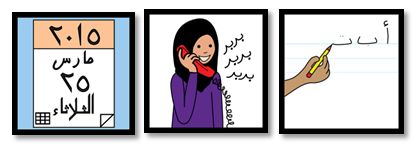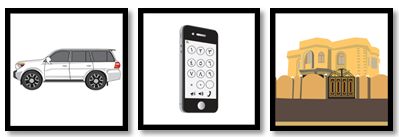Over the last few months Dana Lawand (as the project graphic designer) has been building up a guide to the changes she has been making to the symbols that have been developed for each voting session. Here are just a few of the early guidelines that may help others working in the world of localisation.
Qatari dress code
- Emphasis on Qatari dress code in public. How men and women appear in their traditional clothing in public. Culturaly appropriate dress for young women, children are too young for the rules of the dress code so their dress is more colourful and casual and even westernised at times depending on age.
Local Landmarks
- Food, museums, animals, sight seeing have been added or adapted to suit the locality – one humped camels and food with a joint rather than small pieces etc.

Arabic language
- Words that appear within the boundaries of a symbol have been changed to the Arabic language so calendars, nonsense words used on the phone such as ‘blah, blah, blah and when writing.
- Appropriate orthography has been used – numbers go left to right, no capitals, cursive script from right to left.
Skin tone
- In the Arabic Gulf area the main skin complexion is tan so this colour has been used for the majority of symbols.
- However, some different skin tones have been used where there are groups, as Qatar is a country with many different people from around the globe – migrant workers comprise 86% of the population and 94% of the workforce (Wikipedia)
Social settings
- Dress code has been much debated and voted upon with mixed results as has the need for
- Appropriate male and female gatherings, the two (men & women) are commonly separated.
Vehicles, homes and technology
- In Qatar cars have to cope with desert as well as the city life in the fast lane. Drawings of various types of new model vehicles have been created from the land cruiser to the truck.
- The latest smart phones are widely purchased by Qataris and of course contain Arabic numerals and language systems.
- Homes owned by Qataris are normally large and have high walls surrounding them, whereas the migrant population tend to live in flats or smaller clusters of houses.




